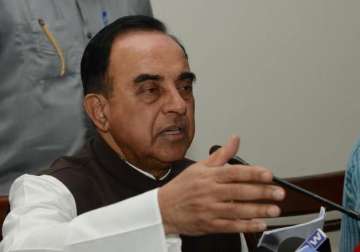New Delhi: Days after it supported prosecution of BJP leader Subramanian Swamy over hate speech against Muslims in his book on terrorism, the NDA government on Wednesday backtracked on its stand saying, that an affidavit filed by the Home Ministry in the Supreme Court does not reflect its stand.
The Home Ministry official, in his earlier affidavit on Oct 28, had said that the petitioner, Swamy, had written a book named Terrorism in India wherein he made hate speech against the community of India.
"The book--its theme, its language, its innuendos, the similes it employs and the moral of its story, if any--in order to ascertain whether the offending passages read in the context of the book as a whole fall within the mischief of Section 153A. The book to be considered in all its aspects as it contains matter which promotes feelings of enmity and hatred between Hindus and Muslims in India. Therefore, the petition has violated sections of IPC," the earlier affidavit had said.
But submitting a two page-additional affidavit on Wednesday, the MHA contended that the earlier affidavit is “in no way the conception” of the ministry regarding Swamy's book, and that the book is the subject matter of legal challenge before trial courts.
The apex court was hearing Swamy's plea against the order of an Assam trial court issuing an NBW against him for failing to appear before it on March 19 in a case of alleged hate speech.
The Centre has sought in the Supreme Court the dismissal of BJP leader Subramanian Swamy's plea challenging the constitutional validity of penal provisions on speeches and writings that could cause enmity and hatred among communities.
Swamy, who is facing a court case in Karimganj in Assam for allegedly delivering an inflammatory address at Kaziranga University, sought relief from the apex court in the case.
He also challenged the constitutional validity of Section 153A (Promoting enmity between different groups on grounds of religion, race, place of birth, residence, language, etc, and doing acts prejudicial to maintenance of harmony) of the Indian Penal Code.
